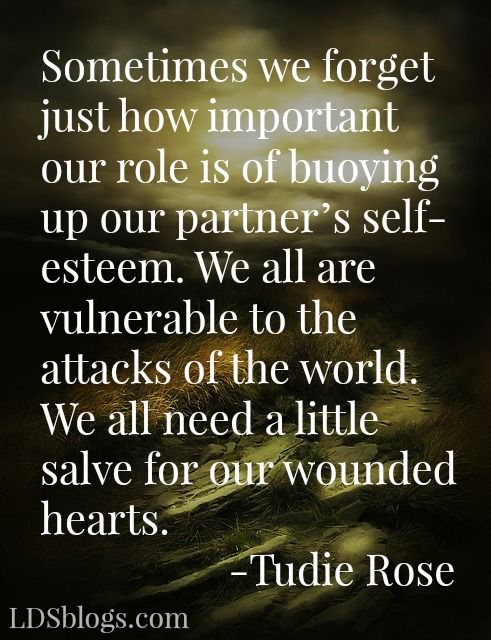 Everyone has an Achilles heel. Even the most self-assured and well-adjusted people have things they are sensitive about, or things which make them uncomfortable. As we travel through life, we all get a few hard knocks. Some of those hard knocks chip away at our self-esteem. A good marriage is like a giant roll of bubble wrap for those self-esteem issues.
Everyone has an Achilles heel. Even the most self-assured and well-adjusted people have things they are sensitive about, or things which make them uncomfortable. As we travel through life, we all get a few hard knocks. Some of those hard knocks chip away at our self-esteem. A good marriage is like a giant roll of bubble wrap for those self-esteem issues.
I will keep telling you that you are important, deserving, loving, intelligent, worthy, compassionate, beautiful, creative, inspiring, brave, true, strong, and able until you finally realize it for yourself.—The Virtual Typewriter
If we all told our partners how important and deserving they are every single day, those chips that have been knocked loose in their self-esteem would not only have bubble wrap, but super glue. What an honor it is to be trusted by our partners to be that super glue in their character! It is one of the things that make marriage unique from any other relationship. We hold the key to our partner’s heart and soul in our hands. We can open the lock and pour in love and compassion, or we can hide the key and watch the light grow dim in our spouse’s eyes.
Sometimes we forget just how important our role is of buoying up our partner’s self-esteem. At the risk of stereotyping, I think men have a difficult time expressing to their wives just how much they appreciate the qualities they possess. On the flip side, women see their husbands as strong and brave, and forget they have a soft vulnerable side. Men and women are more alike than we realize. We all are vulnerable to the attacks of the world. We all need a little salve for our wounded hearts.
 C. Kay Allen, a psychologist and family counselor, shed some light on this subject.
C. Kay Allen, a psychologist and family counselor, shed some light on this subject.
Good self-esteem and good relationships are both a cause and effect of each other. I feel a special trusting closeness to certain people. Once I’d tasted it in our home, I knew I never wanted to settle for anything less. Over the years, my wife and I have developed an instinct for dealing with each other—and the instinct is nearly always right. I hunger and thirst for her company and that of my children because they are such a totally safe place for me to be. Because I feel such total love and trust, my self-esteem—and my power to change—is high. I know we can work out any problem we have (C. Kay Allen, Ensign Feb. 1979, “Where Self-Esteem Starts”).
Our marriage should be a place of complete trust. At the end of a rough day, each partner should feel like they are jumping off the high wire into the safety net. The safety net should have a layer of bubble wrap inside, with swimming pool noodles lining the sides and gymnastic mats covering the floor underneath. Each knot in the net, each bubble in the wrap, each noodle, and each section of the floor mat are built piece by piece as we give and receive compliments, keep confidences, bind up wounds, work through adversities, build trust, stay loyal, and keep vows and eternal covenants.
The things we say to our partner should always be kind. Arguments are going to happen, but fight fair; never attack the self-worth of your partner in anger. Each time you do so, you undo knots and pop bubbles—and they tend to disappear faster than it took to build them in the first place.
To create and maintain self-esteem, our words and our actions must always express to the individual that he or she is important and capable. The words the scriptures use are “to lift.” The psychologists would say, “Reinforce the positive.” The secret is simple. Always look for the good in the individual and lift, reinforce the positive by words and actions. Put-downs, words like “stupid” or “dummy,” or phrases like “Why can’t you do anything right?” destroy self-esteem and shouldn’t be part of our vocabulary. It is impossible to emphasize the good in others if negative words or phrases are readily available on the tips of our tongues or expressed through our gestures (Dallas N. Archibald, “Born of Goodly Parents”, Oct. 1992 General Conference).
Many years ago as a leader of a Camp Fire youth group, I taught a class of 10-year-olds how to be “peer proof.” It was basically a self-esteem building class. The hardest part of the class was teaching them about put downs. Our society not only accepts put downs, but seems to promote them. They were so engrained in their habits that it took a lot of work to turn put downs into compliments. Isn’t that always the way with bad habits? It is much more work to get rid of a bad habit than it is not to develop one in the first place.
Wherefore, be faithful; stand in the office which I have appointed unto you; succor the weak, lift up the hands which hang down, and strengthen the feeble knees. (D&C 81:5.)
The office appointed you in this case is spouse or eternal partner. Since we all have vulnerable and weak spots, it is our job to be faithful and succor our partner and lift up her/his hands, and to strengthen his/her feeble knees. Build up your partner’s self-esteem. Let the one you love more than life itself know that he/she matters and has worth. Make a habit of giving compliments and a trusted ear. Delete put downs from your vocabulary. Be the bubbles that wrap around the most precious gift God has given to you. Make your marriage the safest place on earth.
Tudie Rose is a mother of four and grandmother of ten in Sacramento, California. You can find her on Twitter as @TudieRose. She blogs as Tudie Rose at http://potrackrose.wordpress.com. She has written articles for Familius. You will find a Tudie Rose essay in Lessons from My Parents, Michele Robbins, Familius 2013, at http://www.familius.com/lessons-from-my-parents.








I get a good tongue lashing from my wife at least once a week. When she’s mad she calls me all kinds
of terrible names . One of my three daughters does the same thing to me. For 30 years
now, she’s told me what a terrible father I was. I don’t know what to do about it. I’ve prayed about it
for many years. Nothing changes. I try to be a nice guy and just listen and do better. One thing I don’t
do any more is try to put them in their place. That starts a war every single time. The gospel is very
interesting when it comes to application. It’s portrayed very idealistic but not very realistic.
I’m so sorry you are having this experience. Tongue lashings do not build good self-esteem, or good marriages. Sadly, one of your children has picked up the habit, which will not bode well for her in the future. Unfortunately, we are all subject to the agency of others–but then again, that was all part of the plan we all voted for in the beginning. Have you sat down with your wife in a calm setting and told her how this makes you feel? Possibly, it is time for you and your wife to consult with your Bishop? Marriage counseling?
I hope you can resolve this issues. Maybe it would be helpful to sit down with your wife and find out what “specific” things you are doing make her consider you a bad father. Specific things can be worked out; tongue lashings about being a bad father won’t help. There are moments in all our lives when we are not the perfect parents — heavens, I’ve had many of those moments. In those moments, it’s helpful if my husband says, “You know, you really could have handled that a little better. I don’t like it when you lose your temper.” It would not help at all if he said, “You’re such a lousy mother!” Is it possible to point out that difference to your wife? Is it possible to point out to her that your daughter is now picking up the habit of berating you?
I’ll pray for your family and your ability to work this out.